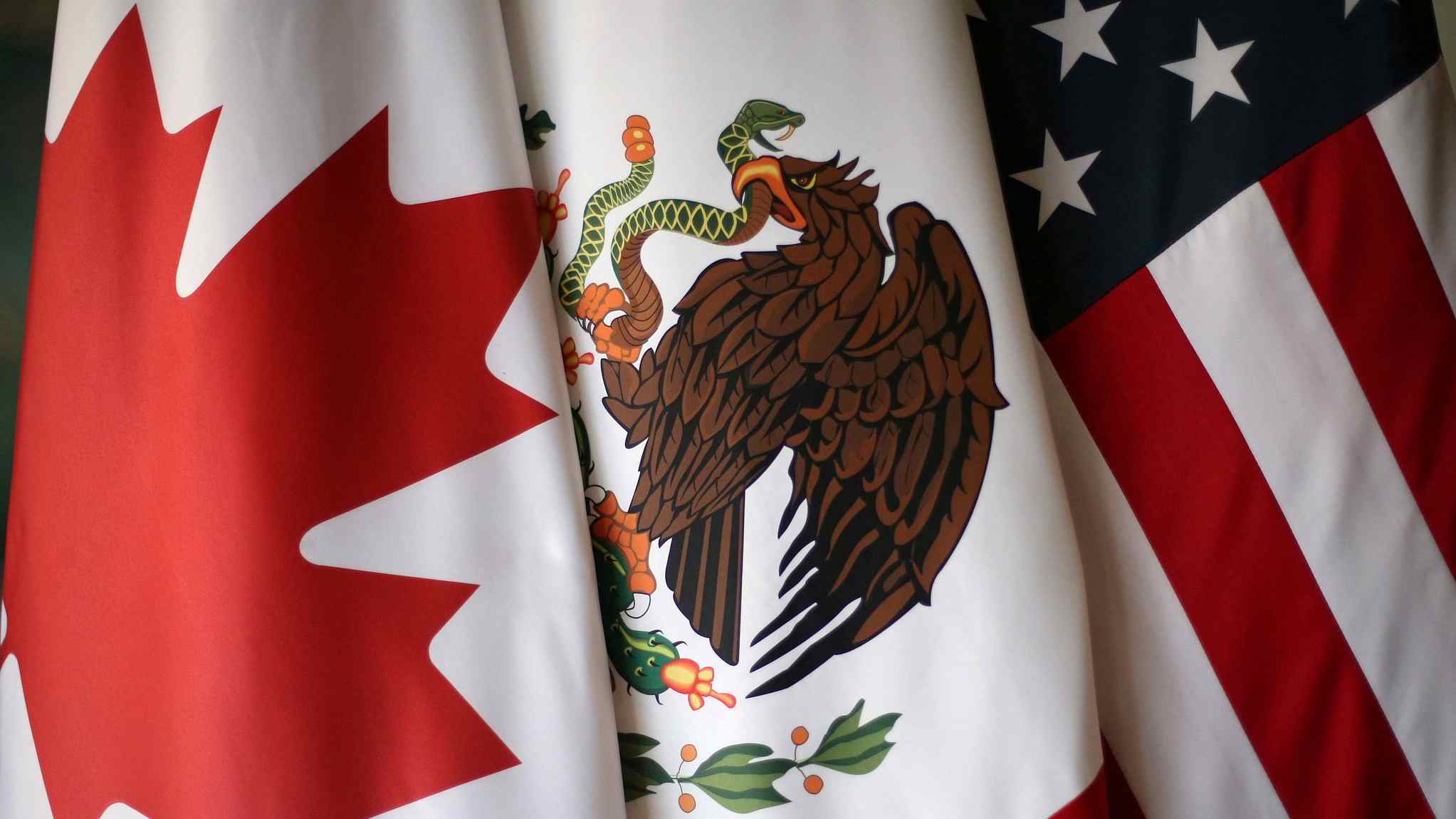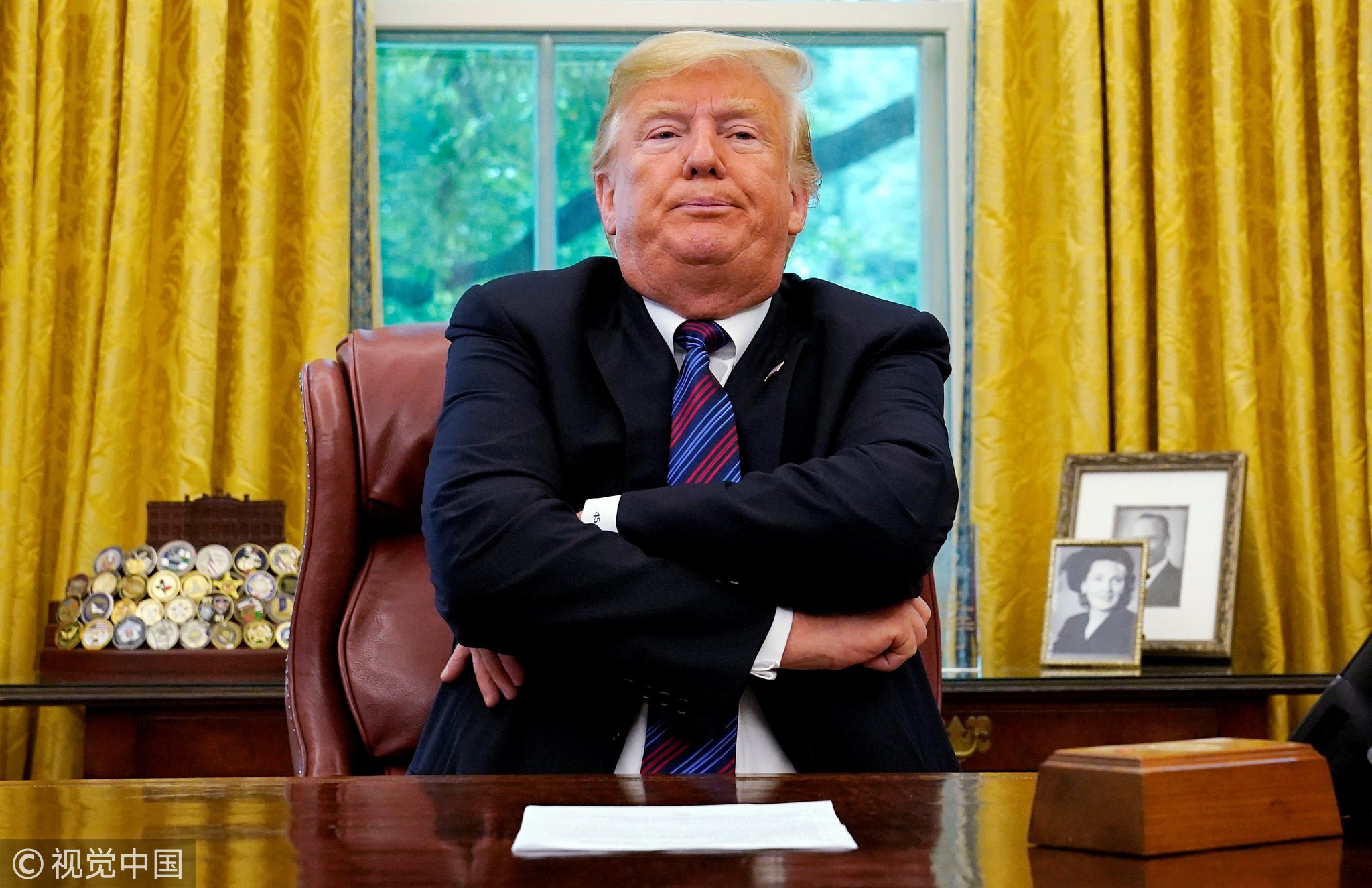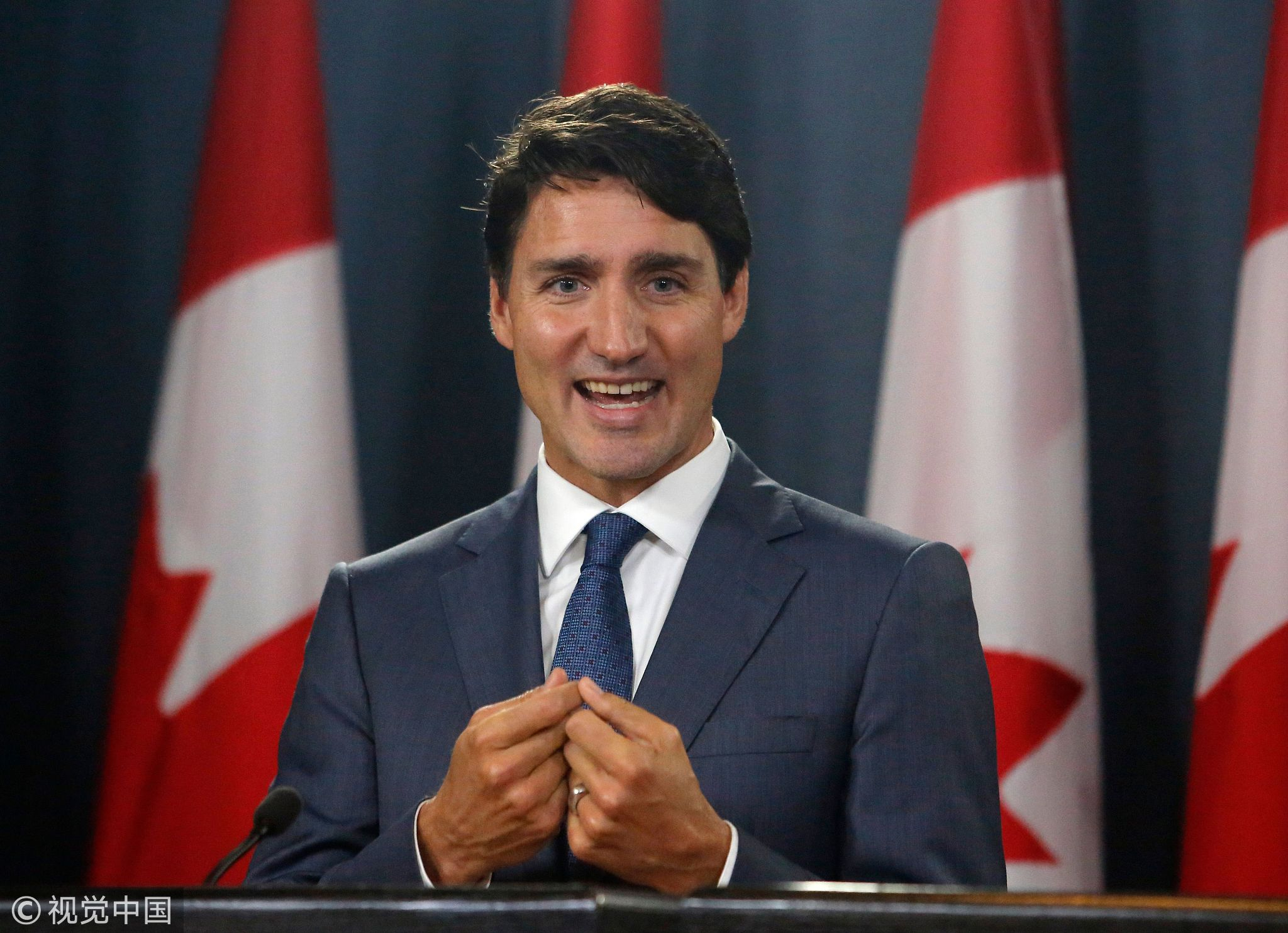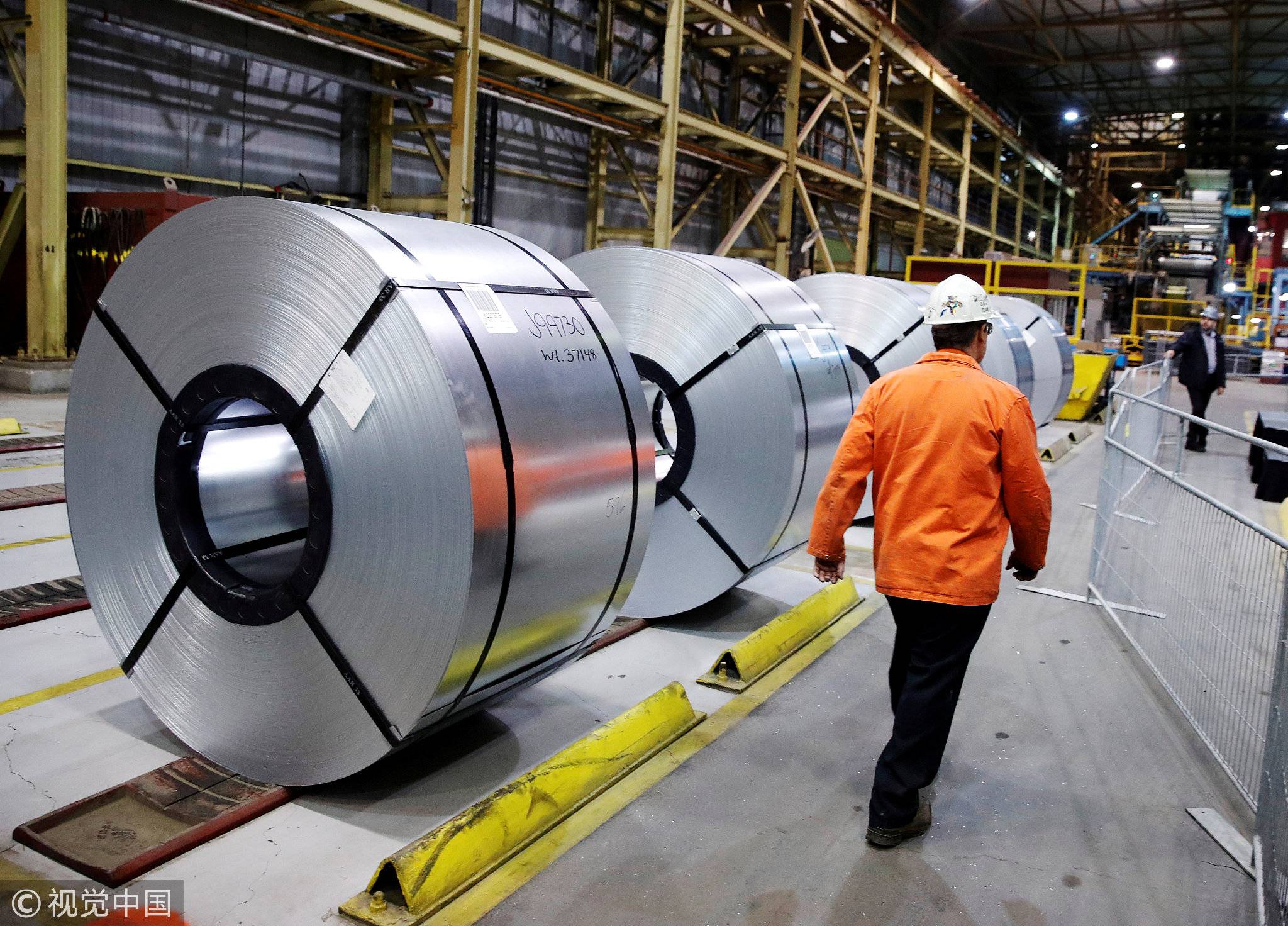
Opinions
13:56, 03-Oct-2018
Opinion: Trump re-negotiating NAFTA might be about China
Updated
12:56, 06-Oct-2018
Ken Moak

Editor's note: Ken Moak taught economic theory, public policy and globalization at the university level for 33 years. He co-authored a book titled "China's Economic Rise and Its Global Impact" in 2015. The article reflects the author's opinion, and not necessarily the views of CGTN.
In the absence of major changes to the original North America Free Trade Agreement (NAFTA), US President Donald Trump's renegotiating it with Canada and Mexico might not be about America, but about China.

US President Donald Trump sits behind his desk as he announces a bilateral trade agreement with Mexico to replace the North American Free Trade Agreement (NAFTA) at the White House in Washington, US, August 27, 2018. /VCG Photo
US President Donald Trump sits behind his desk as he announces a bilateral trade agreement with Mexico to replace the North American Free Trade Agreement (NAFTA) at the White House in Washington, US, August 27, 2018. /VCG Photo
The only changes Trump made from the months of "intense" negotiations and threats are: quotas on how many cars Mexico and Canada can export to the US without having to pay heavy duties; cars entering the US market must have 75 percent of parts produced in North America; Mexican wages must be at least 16 US dollars per hour; and US farmers can have 3.6 percent of the Canadian dairy market – the same percentage that the previous Conservative government conceded to the now-defunct Trans Pacific Partnership (TPP).
The sticky point, the dispute resolution mechanisms – Chapter 19, independent arbiters to resolve trade disputes, and Chapter 20, government panels to address disputes – are left intact in the new deal, renamed as the US-Mexico-Canada-Trade Agreement (USMCA). However, the US did manage to keep tariffs on steel and aluminum.
Effects of USMCA on North American economies
It could be argued that the deal, which Trump boasted as the most "modern and fair" trade agreement ever reached, might be worse than the old one he renegotiated. Keeping the tariffs on steel and aluminum have already increased the cost of producing a car in America, prompting the head of Ford Motors to complain the duties will decrease his company's profit by one billion US dollars. Absorbing the tariffs or passing them to consumers are assumed to have the same effect on the "bottom line".
While the 75 percent local content provision might discourage automobile producers in importing parts from "third countries" the cost of producing the cars will further rise.

Canada's Prime Minister Justin Trudeau announces the new USMCA trade pact between Canada, the United States, and Mexico in Ottawa, October 1, 2018. /VCG Photo
Canada's Prime Minister Justin Trudeau announces the new USMCA trade pact between Canada, the United States, and Mexico in Ottawa, October 1, 2018. /VCG Photo
North American wages are far higher and productivity lower than China's. The Asian giant's efficient infrastructure system, comprehensive supply-chain and relatively inexpensive skill labor force could outproduce any country on earth.
On Canada's dairy concessions, it is unclear, at least at this juncture, how much US farmers would benefit from Canada's minuscule dairy concession. Having over 90 percent of the dairy market, Canadian farmers would be able to maintain their "supply management" pricing model, restricting supply to obtain the desired prices.
The pricing model works because of the Milk Market Board, the sole legal buyer of milk. Farmers cannot produce and sell as much milk as they want, they can only sell their quota. What's more, any surplus milk must be dumped, selling it in the market is illegal penalized by heavy fines.
Although US dairy products could enter Canada unfettered, consumers may not benefit because importers and retailers might be pressured into setting the prices of American products the same as those of Canada.

Rolled up steel sits in the ArcelorMittal Dofasco steel plant in Hamilton, Ontario, Canada, March 13, 2018. /VCG Photo
Rolled up steel sits in the ArcelorMittal Dofasco steel plant in Hamilton, Ontario, Canada, March 13, 2018. /VCG Photo
Further, Canadian taxpayers are forced into paying "two prices" for the same product. One is the product price and the other is the additional tax they must pay to subsidize farmers' losses.
Mexican workers might be the only winners from the deal. Under NAFTA, real wages in Mexico actually decreased while those in Canada and US only marginally increased. The 16 US dollar per hour wage negotiated is in fact the highest a Mexican auto worker has ever earned.
Taking the analysis to its logical conclusion, the deal might reduce automobile production in North America because of the expected higher costs and prices.
Consumer indebtedness is prohibitively high in both Canada and the US, respectively exceeding 100 percent and 70 percent of disposable income, deterring them from paying higher prices for cars or anything else. Higher production costs coupled with lower demand could discourage investment. Business is all about money and profit after all.

A farm in San Luis de la Paz, Guanajuato state, Mexico, August 15, 2018. /VCG Photo
A farm in San Luis de la Paz, Guanajuato state, Mexico, August 15, 2018. /VCG Photo
The Canadian Liberal government could encounter a backlash from farmers, steel workers and consumers. For example, dairy farmers and steel workers are complaining that the government has "sold them out". Already burdened with high debts, housing and other living costs, taxpayers might not be too happy paying more taxes to support dairy farmers.
Republicans and Trump himself might be at risk of losing the 2018 congressional midterm and 2020 presidential elections if the economy does not turn out the way he claimed. Indeed, the shape of the economy will likely continue to be a key factor in determining an election outcome, as pointed out by Bill Clinton's slogan, "It's the economy stupid."
What is Trump's irrational trade policy all about?
Trump's initial harsh treatment of Canada and Mexico – even go as far as to belittle Canadian Prime Minister Justin Trudeau and might have shortened the life span of the prime minister and his foreign minister by a few years – could be more political theatrics than trade. The USMCA does give the impression that he is a "reasonable" man, hoping to form "a coalition of the willing" to counter China.
In that sense, don't be surprised if Trump will go "soft" on the EU and his other "friends" in Asia. Most of these countries share Trump's view that China is carrying out "unfair" trade practices. Having them on his side would strengthen his stance against China. What's more, the EU and Japan are also wary of China's rise and growing global influence. Getting them on board might not be too difficult.
A final comment
China should be prepared for the worst because more hostilities from the US might be on the way, regardless of who wins the congressional midterm election or the 2020 presidency.
(If you want to contribute and have specific expertise, please contact us at opinions@cgtn.com.)

SITEMAP
Copyright © 2018 CGTN. Beijing ICP prepared NO.16065310-3
Copyright © 2018 CGTN. Beijing ICP prepared NO.16065310-3